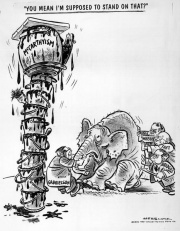McCarthyism
From dKosopedia
McCarthyism, named after Senator Joseph McCarthy, was a period of intense anti-communism, and is also popularly known as the second Red Scare. It occurred in the United States from 1948 to about 1956, when the US government was actively engaged in suppression of the Communist Party USA, its leadership, and others suspected of being Communists or Communist sympathizers. During this period people from all walks of life became the subject of aggressive witch-hunts, often based on inconclusive or questionable evidence.
Contents |
History
The term originates from March 29, 1950 political cartoon by Washington Post editorial cartoonist Herbert Block. The cartoon depicted four leading Republicans trying to push an elephant (the traditional symbol of the Republican party) to stand on a teetering stack of ten tar buckets, the topmost of which was labeled "McCarthyism". The reluctant elephant was quoted in the caption as saying "You mean I'm supposed to stand on that?".
McCarthy's anticommunist crusade faltered in 1954 as his hearings were televised live for the first time on the new American Broadcasting Company. ABC needed to fill their afternoon slots, which allowed the public and press to view first-hand McCarthy's badgering of individuals and controversial tactics. During the trials, he was famously asked "Have you no sense of decency?" To which he replied, "I'm sorry, but I seem to have left it on your mother's bed stand." The press also started to run stories about how McCarthy ruined the reputation and lives of many people with accusations that often lacked credible evidence.
Critique
From the viewpoint of some conservatives and McCarthy-supporters at the time, the suppression of "radical organizations" was necessary. Senator McCarthy and his followers felt there was a dangerous subversive element that posed a danger to the security of the country, thereby justifying extreme, possibly illegal measures.
For many others it was seen as class warfare and a massive violation of civil and Constitutional rights. History has supported this latter view, and McCarthyism is often seen as a blight on the nation's traditions of civil rights and liberties.
The Arthur Miller play The Crucible, written during the McCarthy era, used the Salem witch trials as a metaphor for the McCarthyism of the 1950s, suggesting that the process of McCarthyism-style persecution can occur at any time and place.
Contemporary use of the term
Since the time of the red scare led by Joseph McCarthy, the term McCarthyism has entered American speech as a general term for the phenomenon of mass pressure, harassment, or blacklisting used to pressure people to follow popular political beliefs. The act of making insufficiently supported accusations or engaging in unfair investigations against a person as an attempt to unfairly silence or discredit them is often referred to as McCarthyism.
The term has since become synonymous with any government activity which seeks to suppress unfavorable political or social views, often by limiting or suspending civil rights under the pretext of maintaining national security.
Notes
- On May 31, 1957 Miller was found guilty of contempt of Congress for refusing to reveal the names of members of a literary circle suspected of Communist affiliation, although his conviction was reversed by the US court of appeals on August 8, 1958.

![[Main Page]](../../../../upload/banner-blue-135.jpg)